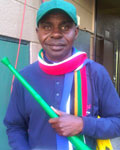According to the McKinsey report, media in Africa is among the fastest growing industries, compared to those of many in the OECD countries. But, despite this growth, experts believe the funding has not been forthcoming as many media houses are still struggling to survive.
"Prior to the 1990s, governments in Africa used to be the only sources of news and information, but with the dawn of democracy, technological advances and education, so many voices and sources have come along, paving the way to the splintering of audiences," Eric Chinje, head of global media development at World Bank Institute, told delegates at the Africa Media and Broadcasting 2010 Congress in Sandton, Johannesburg.
"Media is the bridge between the sender and the receiver. We no longer have that docile, homogeneous receiving audience we could reach through traditional media. This means critical changes have taken place on both sides - the sender and the receiver," Chinje said.
Funding revolution has not happened - Chinje
However, he lamented that despite these important developments, the funding revolution has not happened. "Government and businesses continue to be the sources of media funding," he said.
On the one hand, in many African countries, corrupt and authoritarian governments and their allies invest a lot of money in the media space, owning TV and radio stations and newspapers for propaganda purposes, and also in the aim of diabolising the opposition and critical voices. And in many cases, new entrants - mostly independent enterprises - find it difficult to break through as their strained resources make it difficult to compete.
On the other hand, private companies owned by wealthy businessmen thought to have hidden agendas - as many governments put it - buoyed by advertising revenues, own vast interests in media, and in most of the cases try hard to hold politicians into account, leading to the clash of ideologies and philosophy.
New entrants struggle to survive
And, torn in the middle, are the new entrants in the industry, mostly under-funded and lacking political connections, and therefore struggling to survive as funding sources elapse and shrink as time goes by.
While private media companies rely heavily on advertising, governments do not need advertisers, as they can easily use state resources without being held into account in a continent plagued by lack of accountability and freedom of expression.
And when advertising shrinks, many private enterprises push the panic button.
"Without an expansion in advertising base to match the splintering of media audiences, it is clear why funding of the media, especially for the upstarts, remains challenging," Chinje said.
Look to banks for funding
Cameroon-born Chinje, who admitted that the World Bank has not supported African media development in the past, said African media enterprises should look at banks, financial institutions, development agencies and fund managers as sources of funding.
"That is where the real money is," he added. "If you look at the figures, the amount of media funding coming from banks, financial institutions and development agencies remains negligible."
Unfortunately, there again things might not be easier as expected. It has been established that certain development agencies are looking for numbers rather than content value, which renders the issue of funding even more complex.
"Where is the audience? Where is technology taking us?" These are just some of the questions Chinje said funding agencies are asking before they engage into any funding process.
Chinje said the fundamental question is also about how do media entrepreneurs transform little possibilities they have into bankable business propositions.
For more on the Africa Media and Broadcasting 2010 Congress, go to www.terrapinn.com/2010/mediaza.


















